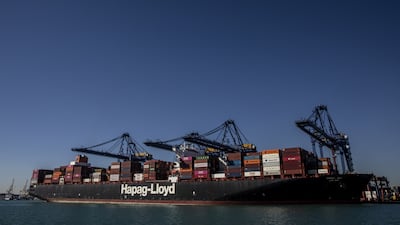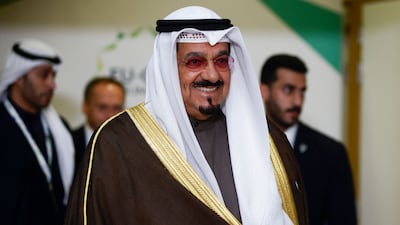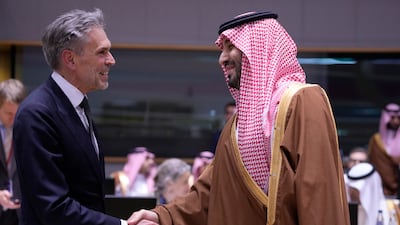As the European Commission prepares for its new term next month, on the heels of the first EU-GCC Summit in October, Gulf countries will be looking to finally secure a free trade agreement after talks began in the late 1980s. Success may depend on Gulf countries studying the EU’s complex structure and processes more closely.
The EU is a strong proponent of regionalism, and while it is open to free trade agreements with individual countries, it favours dealing with economic blocs. For this reason, ever since the then-European Economic Community and GCC established contact in the 1980s, such a deal has been high on the agenda. Unfortunately, a variety of disagreements on economic and non-economic issues have impeded progress, leading to the GCC unilaterally suspending negotiations in 2008.
However, that was at a time when economic diversification was not the utmost priority for the Gulf. Today, that is no longer the case, with the region’s collective strategy to reduce its economic dependence on hydrocarbons being arguably the most important element of its policy programmes.
A free trade agreement with the EU is especially attractive because it offers Gulf countries tariff-free access to one of the largest markets in the world. Many of the industries that Gulf countries are investing in, such as renewable energy and military manufacturing, exhibit “economies of scale”, meaning that the higher the production level, the lower the unit cost. Being able to sell competitively to the half-a-billion EU residents is a potential gamechanger from the perspective of production efficiency, and it is therefore an important plank on the road to a knowledge economy.
On the flipside, securing a deal with the GCC offers EU exporters a considerable advantage over their competitors from East Asia, at a time when much of the bloc’s economy is experiencing sluggish growth. Moreover, it would provide it with a much-needed confidence boost in its efforts to propagate multilateralism and rule of law globally, as the GCC is a significant bloc economically and diplomatically.
Should the GCC be convinced of the advantages of reopening negotiations with the EU, its member states may benefit from a larger investment in understanding their prospective partners.
The EU is an exceptionally complex system that most Europeans themselves struggle to comprehend. Its byzantine structures are rendered even more impregnable by the fact that underneath the bloc’s supranational institutions lie the traditional government institutions of 27 diverse and sovereign states. Moreover, each of these countries has a rich civil society and a vibrant, independent private sector, multiplying the number of relevant actors to an unfathomable degree.
When dealing with one another, GCC members are used to agreeing about issues at the level of heads of state internationally, and then leaving each country the task of filling in the gaps domestically. While GCC-level committees exist in a number of areas, their deference to the upper echelons of government is unquestionable, making negotiations structurally straightforward.
However, this kind of approach is unsuited to the EU, where a comparable hierarchy is absent by design, and where the multiplicity of government and non-government stakeholders transforms negotiations into a Herculean task.
Hercules did eventually triumph in his mythical missions, and a critical element of his success was understanding what he needed to do. In the Gulf, while there exist many impressive universities, there is a dearth of European studies programmes. Gulf diplomats working in Europe surely gain valuable knowledge of the EU’s peculiar systems, but there is no substitute for acquiring a scientific understanding of the bloc through the accumulation of rigorous, interdisciplinary research.
The near absence of European studies programmes in some Gulf countries is symptomatic of a broader lack of area studies programmes, be it Chinese studies, American studies, African studies, Iranian studies and so on. This can sometimes be seen in the Gulf think tank circuit that supports foreign policy: not enough researchers speak any language except Arabic and English, regardless of their area of expertise. On the other hand, foreign researchers focusing on the Gulf often have at least a basic understanding of Arabic, in addition to English and their native tongue.
While there are a number of reasons why Israel and Turkey have prevailed in their free trade negotiations with the EU, it is notable that both countries have an abundance of European studies programmes in their universities. Their private sector and civil society links to Europe, developed over a long period of time, also run deep. This plays an important supporting role in negotiations.
The lack of area studies programmes in the GCC cannot be resolved by merely establishing a sufficient number, as students have to want to enrol in them. That requires a cultural curiosity among students in the Gulf that translates into a greater number of enrolments – proportional to the levels we see in countries such as the US. Otherwise, the knowledge that can critically support complex negotiations will accumulate too slowly.
The increasing incidence of EU-GCC exchange programmes is certainly a step in the right direction, as is the rise in the frequency of track 1 and track 2 dialogues between the two blocs. However, for GCC countries to fully realise their potential, greater investment in gaining a scientific, interdisciplinary understanding of their European brethren is crucial.












